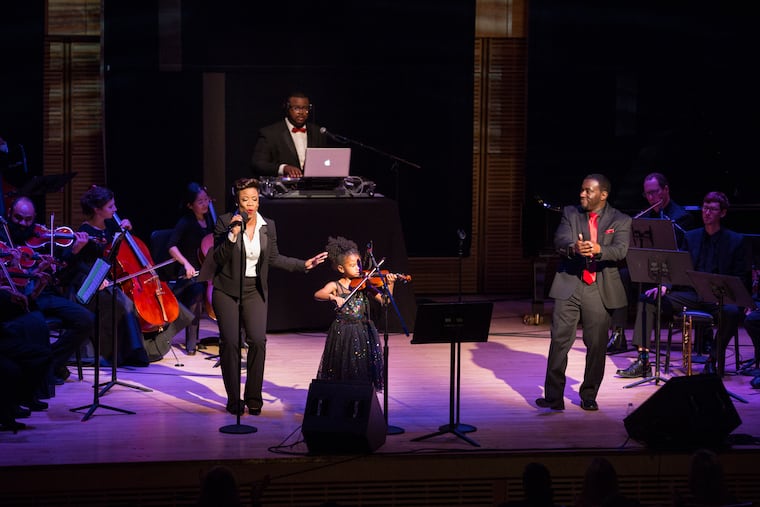Philly’s Illharmonic Orchestra is a house party in a concert hall
Philadelphians Thee Phantom and The Phoenix, whose real names are Jeffrey and Andrea McNeill, lead the world's first hip-hop orchestra.

Like many Black teens in the 1980s, Philadelphia native Jeffrey McNeill was obsessed with hip-hop music and culture. He wrote his first rhyme at 8 years old, and at 12, he mixed the Beastie Boys’ “Paul Revere” and Beethoven’s Fifth Symphony to craft his first beat.
Years later, Coolio’s 1995 hit “Gangsta’s Paradise” gave McNeill artistic purpose. The song, built from Stevie Wonder’s “Pastime Paradise,” landed the late West Coast rapper a Grammy for best rap solo performance and led McNeill to the harmonious blend of hip-hop and orchestral music.
As Coolio, backed by an orchestra, hit the 1996 Grammy stage, McNeill watched in awe. “I pointed to the TV, thinking, ‘That’s it. That’s the idea, and that’s what I want to do,’” he said. “I knew it could work.”
The future MC looked to meld the powers of rap and traditional orchestration and play it in concert halls worldwide. And with the Illharmonic Orchestra, he did just that.
By the late 1990s, McNeill was recording and making music, but he wasn’t performing as regularly as he wanted. That changed when he began dating his wife and musical collaborator, Andrea, in 2000.
On their first date, McNeill took Andrea to see Mary J. Blige in Atlantic City and the two connected through their love of hip-hop, jazz, soul, and classical music. The two music lovers eventually joined hands on stage; She started out as McNeill’s hype woman, then became the group’s lead vocalist soon after.
Going by the stage names “Thee Phantom” and “The Phoenix,” McNeill and his wife perform classic hip-hop records that are woven together by a DJ and rotating ensemble comprised of trumpeters, cellists pianists, violinists, and other instrumentalists — mostly of color.
“It’s like a house party in a concert hall,” McNeill said, with audiences dancing through aisles as the duo play their orchestral renditions of songs like the Notorious B.I.G.’s “Big Poppa,” Eric B and Rakim’s “Don’t Sweat the Technique,” and other beloved hip-hop records.
“Hip-hop is an amalgamation of jazz, soul, breakbeats, and disco,” Andrea said. “But it also has instrumentation, and we’re putting a face to that. You’ve heard it on the radio or wax, but you haven’t necessarily made a connection to that sound in a Rakim song as a standing bass, or the piano in ‘The Bridge Is Over.’ It opens up the mind in another way.”
As many opportunities opened up for the orchestra, there was just as many “nos,” Andrea said.
“A lot of places were afraid of hip-hop,” she said. “Hip-hop is quintessentially Black, and bringing hip-hop into a classical space made people very uncomfortable.”
There was skepticism from the classical and hip-hop community. It was, as Jeffrey McNeill said, “draining” to continue spending their own money to rent venues and produce shows. “It was really tough to get booked on our own,” he said.
The couple was on the verge of disbanding, but in 2015, things began to change. That year, the orchestra was tapped to play at Carnegie Hall. McNeill brought a 25-piece ensemble to play at the famed concert hall, becoming only the third hip-hop artist to headline a show at the New York venue.
After Carnegie Hall, the orchestra continued to perform across the country, and even sold out the Kennedy Center in 2017. To date, the couple have had over 200 musicians take part in their touring orchestra.
Phill Charles, who joined the orchestra as a DJ in 2010, said Illharmonic looks to change the audience’s perception of hip-hop performances. “The orchestra is vast, diverse, and talented,” said Charles, who performs as DJ Philly C. “You can count on them at any time in any city. There are no wild cards because they have performed with us, been vetted, and they fit together like Legos.”
For Kelly Lee, chief cultural officer for the City of Philadelphia, the orchestra is a great representative of Philly, and she’s happy to see the ensemble receive its just recognition. “The Illharmonic Orchestra blends two iconic parts of Philly music culture into one genre-bending art form that makes hip-hop more accessible to orchestra lovers, orchestra music more accessible to hip-hop lovers, and lovers of both,” she said.
Philadelphia writer and DJ John Morrison, currently working on a documentary about the group, said what Illharmonic has done over the years is “mind-blowing.” “Working on this film has been eye-opening,” he said. “I’ve been able to go to a few of the orchestra’s performances, and seeing the reaction from the crowds has been powerful to witness. I didn’t get a full picture before we started the process, but watching the audience respond has opened my mind.”
“It’s not a gimmick for us,” Charles said. “This is not like a thing that we’re just doing because it’s in vogue right now. This is what we’ve always done.” Although other hip-hop orchestras have surfaced in recent years, the Illharmonic ensemble is the first of its kind.
The couple want to extend the Illharmonic legacy in a way that makes a community impact. With the documentary and continued performances, they want to inspire more instrumentalists of color to pursue their musical ambitions.
“Representation means something; it’s important on all levels,” Andrea said. “One of the things that gives me the greatest joy is being in a room full of gifted musicians, and we’ll continue to move with a certain level of intention.”